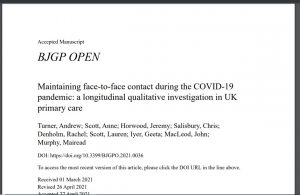How did GPs manage face-to-face appointments during the first wave of the COVID-19 pandemic?
1 September 2021
General practices creatively and rapidly adjusted the way they operate during the COVID-19 pandemic to continue face-to-face contact for patients who needed it most, research by NIHR ARC West and the Centre for Academic Primary Care at the University of Bristol has shown.
A key finding was the innovation and flexibility demonstrated by general practices to respond to the new and challenging circumstances of the pandemic. However, these adjustments strained the available capacity and put increased pressure on practices.
In March 2020, the COVID-19 pandemic meant UK general practice had to rapidly adjust to reduce infection risk by minimising face-to-face contact with patients. However, some face-to-face contact remained necessary and practices needed to ensure this could continue safely. GP practices in Bristol, North Somerset and South Gloucestershire implemented measures to allow COVID-19 patients, low-risk and shielded patients to be seen by their normal doctor, while making face-to-face contact with patients as safe as possible.
The Rapid COVID-19 Intelligence to Improve Primary Care Response (RAPCI) study examined how GP practices responded to the pandemic. The most recent results from this study examined how GPs decided when face-to-face contact was necessary and how it could take place.
These results were based on 87 interviews with clinical and managerial general practice staff at four points between May and July 2020, in 21 general practices in Bristol, North Somerset and South Gloucestershire.
The study found that practices worked within national guidance to determine when face-to-face contact with patients was necessary. This included prioritising patients according to clinical need and using face-to-face contact when GPs were uncertain of a diagnosis or to reassure patients.
To make face-to-face contact as safe as possible and keep patients socially-distanced, practices altered their appointment processes and introduced a wide range of measures. These included taking advantage of their indoor and outdoor spaces, such as using carparks as waiting and treatment areas.
As the UK passed the peak of the first wave of the pandemic in June and July 2020, in person GP services were scaled-up again and confidence seeing patients face-to-face grew. However, the need to maintain social-distancing and enhanced infection control measures reduced capacity and were time consuming, increasing pressure on practices.
The action taken by practices in the Bristol, North Somerset and South Gloucestershire area can inform future decisions about how practices can reduce infection risk for patients and staff, while maintaining responsibility for their own patients, rather than directing them elsewhere for treatment.
Dr Andrew Turner from NIHR ARC West, first author on the paper, said:
“The way practices responded and adjusted to the pandemic highlights the importance of providing good centralised guidance while allowing local flexibility. This is also an important lesson to highlight as practices continue to adjust their services as they recover from the pandemic.”
Paper
